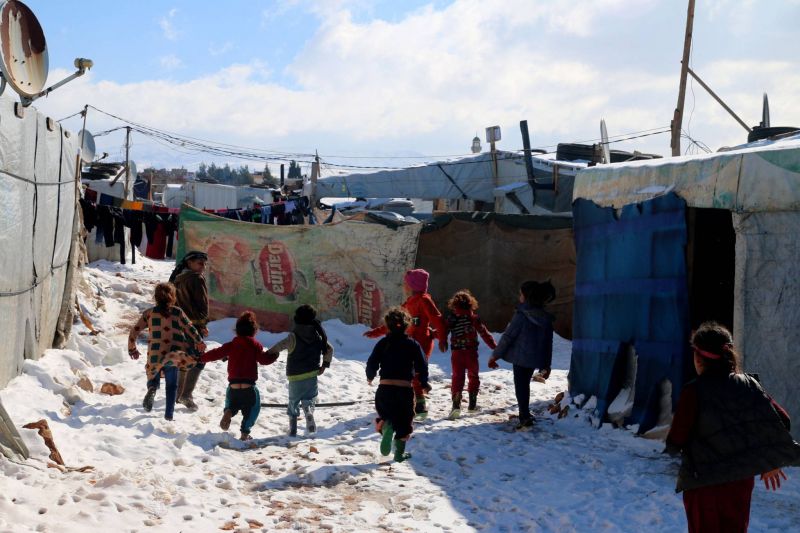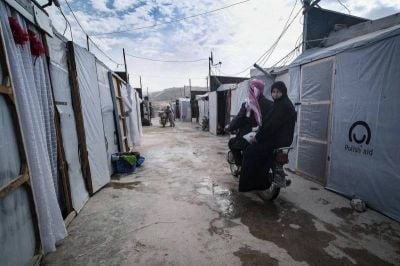
Syrian children in el-Hilal refugee camp, near Taybeh in the Baalbeck region of the Bekaa, Lebanon, on January 20, 2022. (Credit: AFP)
BEIRUT — General Security (GS) announced Thursday that Syrian refugees wishing to return to Syria can register for repatriation starting Thursday, May 4, at its offices. The announcement was made amid increased attention given to the Syrian refugee file in the past weeks.
In a statement published on its website, GS announced that it will restart "voluntary returns from Lebanon to Syrian territory" for "displaced Syrians wanting to return to their hometowns." Applications for returns can be submitted from Monday to Friday, between 3:00 pm and 6:00 pm at GS centers starting Thursday May, 4.
"The situation of those leaving Lebanon will be regularized free of charge as soon as they leave," the statement added.
The following GS centers are taking applications:
In Beirut: at the directorate in the courthouse area;
In the southern suburbs of Beirut: Abdel Karim Hodroj martyr center, Tayyouneh;
In Mount Lebanon: in the centers of Haret Sakher, Damour, Bourj Hammoud and Beiteddine;
In the South: in the centers of Nabatiyeh, Shebaa, Tyre, Zahrani, Joaya, Bint Jbeil, Qana, Jbaa, Marjeyoun, Taybé, Hasbaya, Jezzine and Tebnin;
In the Bekaa: in the centers of Mechghara, Rachaya, Jeb Janine, Bouarej, Zahle, Rayyak, Chamstar, Nabi Chiit, Deir el-Ahmar, Labweh, Baalbeck, Hermel, Ersal (in the new center installed in the municipality building);
In the North: in the centers of Tripoli, Koura, Bebnine, Halba, Minieh, Zgharta, Becharreh, Batroun, Denniyeh, Baino, Mechmech, Kobayat.
General Security told L'Orient Today on Thursday that some 500 Syrian refugees registered at one of its centers in Ersal between Wednesday and Thursday.
Repatriation initiatives have been ongoing since 2018. In previous operations, the names of Syrian nationals registered with the GS would be sent to Damascus, which either approved or rejected repatriation requests. Buses would then be sent to pick up applicants from several areas of Lebanon, before heading to the border and then to various Syrian villages.
These operations were carried out under the supervision of several international organizations.
It was not yet clear if the same process will be implemented for the new return campaigns and GS did not comment on the issue.
The previous repatriations were described as voluntary, but human rights groups considered them to be forced, claiming that some refugees were tortured and persecuted upon their return to Syria.
The last of these operations, launched as part of a new plan initiated by the Ministry of Social Affairs in 2022, had only attracted a few hundred refugees.
Following up on the revival of the repatriation efforts, director of the General Security Elias Baïssari, who is in charge of following up on the refugee file, travelled to Damascus last week to discuss the issue with Syrian authorities. The press service of GS told L'Orient-Le Jour that the director of the security service "will speak this week and will detail the measures he has taken." No details have yet been released about this visit.
Caretaker Minister of Interior Bassam Mawlawi announced on Tuesday new measures targeting refugees, calling on the country's mohafazat (governates) to "identify and register displaced Syrians," and to stop renting real estate or issuing documents to unregistered refugees.
Other measures were issued in late April. The Lebanese authorities had instructed several ministries to implement enhanced measures which include restrictions on border crossings and proof of birth registration.
The return of the issue of repatriating Syrian refugees, which has become the fixation of several — particularly Christian — political leaders, has raised fears of a security crisis in Lebanon.
Reporting contributed by Sarah Abdallah
